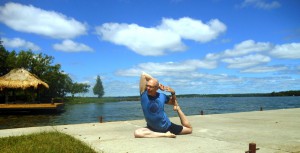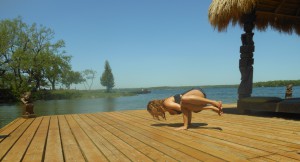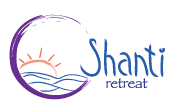Balasana, also known as child’s pose, is a resting/restorative pose practiced
in the fetal position. It is a wonderful counter pose for backbends. The name is
derived from the Sanskrit words “bala” and “asana”, which translate to “child” and
“pose”. Its main focus is the thighs, although it’s also useful in relieving back,
shoulder, neck, and hip strain. When performed with an open mind Balasana
can induce a great sense of physical, mental and emotional relief.
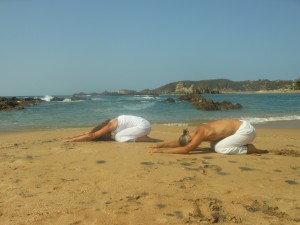
The Benefits of Child’s Pose:
• Releases tension in the back, shoulders and chest
• Recommended if you have dizziness or fatigue
• Helps alleviate stress and anxiety
• Compresses the body’s internal organs and keeps them supple
• It lengthens and stretches the spine
• Relieves neck and lower back pain when performed with the head and
torso supported
• It gently stretches the hips, thighs and ankles
• Normalizes circulation throughout the body
• It stretches muscles, tendons and ligaments in the knee
• Calms the mind and body
• Encourages strong and steady breathing
About the Authors
Darin and Wendy have been studying, practicing and living yoga for more than 20 years. Their desire to explore this ancient philosophy has taken them on many journeys around the globe. Both are trained in classical Hatha yoga, in the Sivananda tradition, and have studied extensively a form of energy and chakra yoga, Agama Yoga, in southern Thailand www.agamayoga.com. Their daily Spiritual Heart (Hridaya) meditation practice follows Ramana Maharshi’s Self Inquiry Method. During the winter season they take the opportunity to deepen their practice by participating in 10 day silent medition retreats in Mazunte, Mexico at Hridaya Yoga School www.hridaya-yoga.com . – See more at: https://www.shantiretreat.ca/2014/04/#sthash.baitU7KM.dpuf
Pigeon pose has many permutations, ranging from a full resting version (pigeons get tired too!) to a big bold back bend. This bound version has always made me feel open and creative. Having long limbs helps with finding some of these deeper binds.
My word of caution when doing any deep back bend is to a) not do too many as they can over stimulate the adrenals, and b) make sure you are stable in your pelvis and lumbar – especially those of you who are very flexible (it is easy to compress vertebrae and over years of doing this quite literally cause deterioration). Be happy, proud (and safe) in pigeon!
About the Author
http://www.lorenottawayoga.com/
Headstand (Sirshasana): a whole new way of seeing the world!
Headstand, and inversions in general, are seen as one of the most important groups of asanas. Performing headstand includes many physical and energetic or pranic benefits.
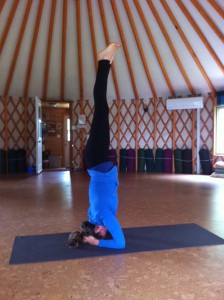
As humans beings, we spend so much time standing on our feet, so when performing headstand, we begin to reverse the effects of gravity on our body. On a physical level, the inversion increases blood flow from the lower extremities of the body (feet) to the higher ones (brain). This increases the amount of oxygen that is being delivered to the brain and stimulates glands (pituitary and hypothalamus glands) important for mood, energy levels and overall well-being. As an extra bonus, this all happens with little effort from the heart which is so designed to pump blood upward to the brain.
Headstand also improves circulation and digestion and strengthens the arms and upper body. Headstand can cultivate a greater sense of self-confidence when practiced regularly.
On an energetic level, as energy and life force is carried from the lower chakras to the higher chakras, a sense of clarity and concentration may follow. This is also a great way to bring energy from the lower parts of our being, to the heart, third eye and crown. When headstand is held for longer duration (3-5 minutes), you may begin to experience deep sense of stillness and calming of the mind.
About the Author
Lacey teaches yoga at Shanti Retreat for programs such as mid-week getaway, Sunday Cycle and Stretch as well as Spa and Detox Days. She is traditionally trained in the Sivananda yoga style, yet draws upon various styles and includes teachings from inspiring instructors during her classes.
As one seeks balance, imbalance is just right around the corner. The very thing we seek is also seeking us. Let’s face it, who isn’t seeking more balance?
Side Crow (Parsva Bakasana) is a dynamic and liberating pose improving physical and mental concentration. It may look advanced, but it’s relatively easy to do once you get your balance. The posture will strengthen the arms, wrists and abdominal muscles, improving digestion. The key to securing your balance, is to lower your forehead gaze and transfer your weight onto your hands as you lift your feet of the floor simultaneously. Modify the pose by using both elbows as leverage for a hip and knee as I have done here in the photo. It’s fun to practice, requires focus ~ Give it a try and let me know how you do.
About the Author
Ichih Wang is a Yoga Teacher, and a Yoga Life Coach based in Ottawa, Ontario Canada. Enthusiasm to love your life is contagious around Ichih Wang. She has been around the world 3 times and visited over 60 countries, lived on 3 continents and 4 cities as a search to connect and be a student of life. Her life travels and training experiences are infused in her yoga and life teachings, connecting people to their own abundant possibilities. She is known for her inspirational style of yoga teaching that incorporates both eastern spiritual philosophy and western techniques for mind (mental), body (physical) and spiritual life transformation.You can find Ichih Wang’s workshops and retreat information on
www.LiveLifeYoga.com





